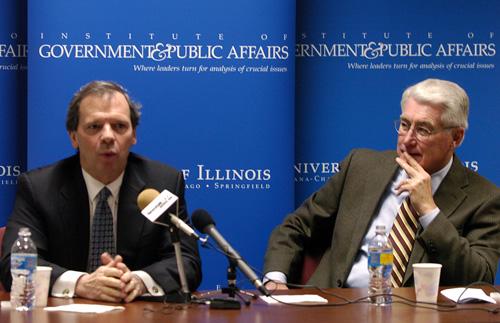Cullerton’s speech emphasizes importance of bipartisanship in Illinois

Illinois Senate President John Cullerton, left, speaks as former Illinois Gov. Jim Edgar looks on at the Institute of Government and Public Affairs in Urbana on Monday. Cullerton was on campus to speak about the state of Illinois and the problems facing Illinois state government in the coming years. Michael Cozza
March 10, 2009
Illinois Senate President John Cullerton knows the relationship between the Democrats and Republicans is not going to be an easy fix.
“I’ve been telling the Republicans that the Democrats are not going to act like Democrats this year,” said Cullerton, D-6, in a speech Monday at the Institute of Government and Public Affairs in Urbana. “But we want you (Republicans) to help us, so maybe you shouldn’t act like Republicans this year.”
He said many people around his home district in Chicago are not in tune with the important issues involved with state government.
“With the Chicago media market, we don’t know much about state government,” he said. “We know who our mayor is. We know who our alderman is, but we don’t want to talk about state government.”
Cullerton also talked about a capital spending bill – legislation enacting statewide investments in roads, bridges and education – saying it is “definitely going to pass” by the end of May. He said a minimum of $25 billion would need to be spent in the endeavor over the next six years.
Get The Daily Illini in your inbox!
He also mentioned that the effect of the federal stimulus on the state budget would be uncertain.
“The comptroller said we have a $9-11 billion dollar deficit,” Cullerton said. “We did have the federal stimulus, but it’s kind of difficult to know exactly what holes that plugs.”
Former Illinois governor and IGPA distinguished fellow Jim Edgar praised Cullerton’s abilities as a leader while also joking about his party affiliation during his introduction.
“It will be a difficult few months and maybe few years in Illinois government,” Edgar said. “I can’t think of anyone better on the Democratic side – I have to be a little partisan – to serve (as senate president).”
After former Gov. Rod Blagojevich’s removal in January, Cullerton discussed efforts to make sure that ethics remain a major concern in the state. He added that he believed the legislature handled the impeachment trial in a fair, bipartisan manner despite contentions from Blagojevich.
“We took this very, very seriously. We had a bipartisan committee, we met with Republicans, and we agreed on the rules,” Cullerton said. “Those rules that he criticized and misrepresented were done with this in mind: We’re all elected officials. We got elected, and this process of removing somebody who got elected with impeachment is a very serious process that any precedent we’d set could be potentially used in the future.”
Cullerton also said that cooperation used to be a more prominent attribute in the state Senate.
“Remember when Barack Obama got elected, we were in the minority,” he said. “The mentality when you stand up to pass a bill, you can’t pass it unless you get someone from the other party to vote for it. So that was our mentality. And there had been much more camaraderie in the old days.”
But the discussion was drawn away from bipartisanship when Cullerton fielded a question about campaign finance reform. Alluding to the democratic majority in the statehouse, Cullerton mentioned that in the end, the differences between political parties are still significant.
“My goal is to elect Democrats,” he said. “The reason why I want to elect Democrats is because my philosophy is a democratic philosophy as opposed to a republican philosophy. We have different philosophies. And I’d like to be in a position to espouse that.”






